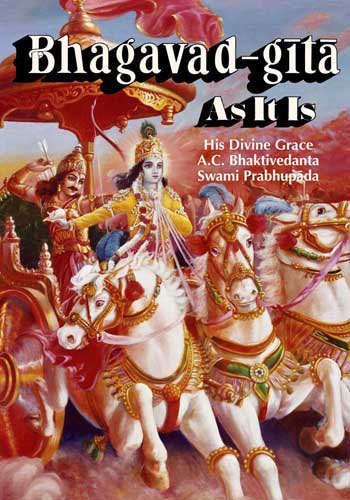

CHAPTER SEVENTEEN: The Divisions of Faith
TEXT 1: Arjuna inquired: O Kṛṣṇa, what is the situation of those who do not follow the principles of scripture but worship according to their own imagination? Are they in goodness, in passion or in ignorance?
TEXT 2: The Supreme Personality of Godhead said: According to the modes of nature acquired by the embodied soul, one’s faith can be of three kinds – in goodness, in passion or in ignorance. Now hear about this.
TEXT 3: O son of Bharata, according to one’s existence under the various modes of nature, one evolves a particular kind of faith. The living being is said to be of a particular faith according to the modes he has acquired.
TEXT 4: Men in the mode of goodness worship the demigods; those in the mode of passion worship the demons; and those in the mode of ignorance worship ghosts and spirits.
TEXTS 5-6: Those who undergo severe austerities and penances not recommended in the scriptures, performing them out of pride and egoism, who are impelled by lust and attachment, who are foolish and who torture the material elements of the body as well as the Supersoul dwelling within, are to be known as demons.
TEXT 7: Even the food each person prefers is of three kinds, according to the three modes of material nature. The same is true of sacrifices, austerities and charity. Now hear of the distinctions between them.
TEXT 8: Foods dear to those in the mode of goodness increase the duration of life, purify one’s existence and give strength, health, happiness and satisfaction. Such foods are juicy, fatty, wholesome, and pleasing to the heart.
TEXT 9: Foods that are too bitter, too sour, salty, hot, pungent, dry and burning are dear to those in the mode of passion. Such foods cause distress, misery and disease.
TEXT 10: Food prepared more than three hours before being eaten, food that is tasteless, decomposed and putrid, and food consisting of remnants and untouchable things is dear to those in the mode of darkness.
TEXT 11: Of sacrifices, the sacrifice performed according to the directions of scripture, as a matter of duty, by those who desire no reward, is of the nature of goodness.
TEXT 12: But the sacrifice performed for some material benefit, or for the sake of pride, O chief of the Bhāratas, you should know to be in the mode of passion.
TEXT 13: Any sacrifice performed without regard for the directions of scripture, without distribution of prasādam [spiritual food], without chanting of Vedic hymns and remunerations to the priests, and without faith is considered to be in the mode of ignorance.
TEXT 14: Austerity of the body consists in worship of the Supreme Lord, the brāhmaṇas, the spiritual master, and superiors like the father and mother, and in cleanliness, simplicity, celibacy and nonviolence.
TEXT 15: Austerity of speech consists in speaking words that are truthful, pleasing, beneficial, and not agitating to others, and also in regularly reciting Vedic literature.
TEXT 16: And satisfaction, simplicity, gravity, self-control and purification of one’s existence are the austerities of the mind.
TEXT 17: This threefold austerity, performed with transcendental faith by men not expecting material benefits but engaged only for the sake of the Supreme, is called austerity in goodness.
TEXT 18: Penance performed out of pride and for the sake of gaining respect, honor and worship is said to be in the mode of passion. It is neither stable nor permanent.
TEXT 19: Penance performed out of foolishness, with self-torture or to destroy or injure others, is said to be in the mode of ignorance.
TEXT 20: Charity given out of duty, without expectation of return, at the proper time and place, and to a worthy person is considered to be in the mode of goodness.
TEXT 21: But charity performed with the expectation of some return, or with a desire for fruitive results, or in a grudging mood is said to be charity in the mode of passion.
TEXT 22: And charity performed at an impure place, at an improper time, to unworthy persons, or without proper attention and respect is said to be in the mode of ignorance.
TEXT 23: From the beginning of creation, the three words oṁ tat sat were used to indicate the Supreme Absolute Truth. These three symbolic representations were used by brāhmaṇas while chanting the hymns of the Vedas and during sacrifices for the satisfaction of the Supreme.
TEXT 24: Therefore, transcendentalists undertaking performances of sacrifice, charity and penance in accordance with scriptural regulations begin always with oṁ, to attain the Supreme.
TEXT 25: Without desiring fruitive results, one should perform various kinds of sacrifice, penance and charity with the word tat. The purpose of such transcendental activities is to get free from material entanglement.
TEXTS 26-27: The Absolute Truth is the objective of devotional sacrifice, and it is indicated by the word sat. The performer of such sacrifice is also called sat, as are all works of sacrifice, penance and charity which, true to the absolute nature, are performed to please the Supreme Person, O son of Pṛthā.
TEXT 28: Anything done as sacrifice, charity or penance without faith in the Supreme, O son of Pṛthā, is impermanent. It is called asat and is useless both in this life and the next.
Continued in CHAPTER EIGHTEEN Conclusion – The Perfection of Renunciation
DONATION REQUEST
If this blog post has stimulated you, or is valued or appreciated by you for any personal reason, or helped you advance your understanding of the subject matter presented; please visit my blog, follow me, up vote, reply, resteem and/or - consider donating to help me continue to spread this knowledge. I will never use these funds for any personal expense. The following are my crypto-coin wallet addresses. THANK YOU.
BTC - 12u3ot6UR5UxVakoFNuhA4vjfrtUGYikBd
ETH - 0x4a7FB485562bCe1E11A71D623684cb2Ef2aFEf45
LTC - LYKxKMUmNHwU2Vc4tSumA47TCAW54TKgpG
I will keep a ledger of all donations and how they are spent in my effort to further my mission as stated in my introducemyself post which you can get straight away by doing a search with the following “upendranath in introducemyself”; this is the quickest. Or you can visit my blog and scroll to the second post. Twice a year I will post this ledger to my blog; in January and in July 

Hi! I am a robot. I just upvoted you! I found similar content that readers might be interested in:
https://www.vedabase.com/en/gg/17